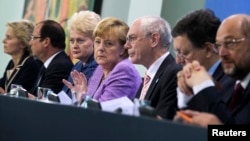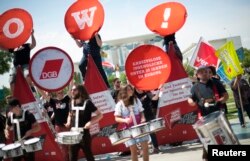BERLIN —
A political crisis in Portugal threatened to overshadow a meeting of EU leaders in Berlin on Wednesday at which Chancellor Angela Merkel had hoped to rebrand herself as a defender of Europe's jobless in the run-up to a German election.
Merkel, whose insistence on spending cuts in return for aid during the euro crisis has made her a target of anger in recession-hit southern Europe, is hosting about 20 of her European colleagues to discuss ways to fight youth unemployment.
Critics have accused her of staging the event, from which no concrete decisions are expected, to soften her image as Europe's leading austerity advocate months before the Sept. 22 vote.
A few hundred protestors gathered in front of the Chancellery in central Berlin as the leaders arrived, waving banners with slogans like “Europe's Youth Needs More Than Merkel's Hot Air.”
“I don't trust our politicians,” said 31-year-old Spanish protester Rosa Donoso, who has come to Germany looking for work. “They're just talking, it's all 'blah blah blah'.”
An estimated 5.6 million young Europeans are unable to find work. Portugal, whose economy has been devastated by the crisis, is one of worst hit and cast a long shadow over the meeting.
Its government appears on the verge of collapse after several top ministers resigned in a row over spending cuts and tax hikes sought by European partners like Germany, the European Central Bank and International Monetary Fund.
Portuguese Prime Minister Pedro Passos Coelho was scheduled to attend and hold a news conference in Berlin.
On the eve of the meeting, Merkel gave an interview with several European newspapers, calling youth unemployment “perhaps the most pressing European problem”.
“We Germans have gathered plenty of experience through our own structural reforms since reunification and we want to share these experiences,” Merkel said of the meeting.
Benevolent Leader
European leaders agreed last week to disburse six billion euros in EU funds over the next two years for job creation, training and apprenticeships.
Merkel has said the goal of the meeting is to discuss “best practices” and decide where the money should go.
Leaders ranging from conservatives Mariano Rajoy of Spain and Antonis Samaras of Greece, to leftists Francois Hollande of France and Enrico Letta of Italy will attend.
In Portugal unemployment is at a record 17.7 percent, with 42 percent of young people out of work. In Greece and Spain youth jobless rates are close to 60 percent, fuelling fears of a “lost generation”.
David Lizoain, a 30-year-old Spaniard protesting in Berlin, called the summit a “photo opportunity” for Merkel.
“She is staging this to look like she is doing something but the amount that's on the table, six billion euros, translates to 1.60 euros per young person in Europe,” he said.
Merkel's main challenger, Peer Steinbrueck of the Social Democrats (SPD), said the EU had announced many initiatives on unemployment “and now, just a few months before the German election, Mrs Merkel has invited people to a summit on it”.
The chancellor's response was “too late, too fainthearted and too vague”, said the center-left German candidate.
Carsten Nickel, an analyst Teneo Intelligence, said the meeting allowed Merkel to present herself as a “benevolent European leader to her domestic audience”.
Merkel, whose insistence on spending cuts in return for aid during the euro crisis has made her a target of anger in recession-hit southern Europe, is hosting about 20 of her European colleagues to discuss ways to fight youth unemployment.
Critics have accused her of staging the event, from which no concrete decisions are expected, to soften her image as Europe's leading austerity advocate months before the Sept. 22 vote.
A few hundred protestors gathered in front of the Chancellery in central Berlin as the leaders arrived, waving banners with slogans like “Europe's Youth Needs More Than Merkel's Hot Air.”
“I don't trust our politicians,” said 31-year-old Spanish protester Rosa Donoso, who has come to Germany looking for work. “They're just talking, it's all 'blah blah blah'.”
An estimated 5.6 million young Europeans are unable to find work. Portugal, whose economy has been devastated by the crisis, is one of worst hit and cast a long shadow over the meeting.
Its government appears on the verge of collapse after several top ministers resigned in a row over spending cuts and tax hikes sought by European partners like Germany, the European Central Bank and International Monetary Fund.
Portuguese Prime Minister Pedro Passos Coelho was scheduled to attend and hold a news conference in Berlin.
On the eve of the meeting, Merkel gave an interview with several European newspapers, calling youth unemployment “perhaps the most pressing European problem”.
“We Germans have gathered plenty of experience through our own structural reforms since reunification and we want to share these experiences,” Merkel said of the meeting.
Benevolent Leader
European leaders agreed last week to disburse six billion euros in EU funds over the next two years for job creation, training and apprenticeships.
Merkel has said the goal of the meeting is to discuss “best practices” and decide where the money should go.
Leaders ranging from conservatives Mariano Rajoy of Spain and Antonis Samaras of Greece, to leftists Francois Hollande of France and Enrico Letta of Italy will attend.
In Portugal unemployment is at a record 17.7 percent, with 42 percent of young people out of work. In Greece and Spain youth jobless rates are close to 60 percent, fuelling fears of a “lost generation”.
David Lizoain, a 30-year-old Spaniard protesting in Berlin, called the summit a “photo opportunity” for Merkel.
“She is staging this to look like she is doing something but the amount that's on the table, six billion euros, translates to 1.60 euros per young person in Europe,” he said.
Merkel's main challenger, Peer Steinbrueck of the Social Democrats (SPD), said the EU had announced many initiatives on unemployment “and now, just a few months before the German election, Mrs Merkel has invited people to a summit on it”.
The chancellor's response was “too late, too fainthearted and too vague”, said the center-left German candidate.
Carsten Nickel, an analyst Teneo Intelligence, said the meeting allowed Merkel to present herself as a “benevolent European leader to her domestic audience”.






